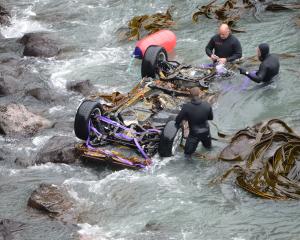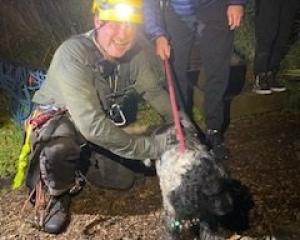
Massey University marine biologist Karen Stockin says Toa has been cared for by humans for a week now, and given he is likely aged less than 3 months old, it's integral that some healthy discussions start beginning about his future.
The young orca calf is currently being cared for 24/7 by Department of Conservation (DOC) staff and volunteers since becoming separated from his mother at Plimmerton, north of Wellington on July 11.
TVNZ has reported the cost of looking after Toa at approximately $10,000 so far, excluding the cost of DOC staff.
Stockin told the Herald today she was beginning to have concerns for Toa's welfare given he was such a young animal who had been dependent, or would be normally, on its mother and its pod to learn "critical, vital life skills".
Given he was so young, there were only two options left for him - euthanasia or putting him into a purpose-built facility of which there was none in New Zealand.
She said the various national and international vets had to this point done an "incredible job" in keeping him alive and stable but he had overnight been diagnosed with colic which meant he was beginning to have some issues.
"Here we've got first the indicators of possible things that are not so well with Toa.
"The reality is, up until this morning, we had no issues with Toa.
"He is still stable to be fair, the vets treated him for colic overnight and he remained stable this morning.
"But as I mention, we've got the health of the animal to consider and then we've got the welfare of the animal to consider and they're not to be considered independently.
"As we know when you are stressed and when you have welfare considerations it can affect your health."
Asked whether trying to find Toa's pod as a needle in a haystack scenario, Stockin said it possibly wasn't that extreme, but it was "complicated and it's not simple and it's not quick".
"Hence we are now in the situation over a weekend now where this whale remains in constant human engagement and interaction which, from a welfare perspective, brings up all sorts of concerns about potential habituation.
"I can see why the public's happy ending is we find the natal pod, we return the whale and everybody is happy but we still have the complexity of first finding the pod."
Even if the pod was found, there were logistical issues of getting Toa to that location, which would be highly stressful in itself "not without its risk".
"And then trying to understand that you've got the female in that pod, as they do break apart, then you've got the aspect of whether there'll be success, and will he recognise that pod and more importantly will he be accepted with that pod.
"These are all unknowns. They come with their own risks and caveats."
While sightings were "exciting", it was still hard to know whether a female orca was lactating and that couldn't be known from a sighting or even from up close out of the water.
"You can't tell that from the surface, you can't point out from the surface and go yep, that female is definitely lactating, it doesn't work that way. Short of you having solid observations of another calf feeding from that female you are limited from your guesswork around the pod having a lactating female."
Stockin said it was known that calves up to three months old would potentially never re-engage with their natal pod, even if it was found.
Asked how long it was healthy, or fair on the animal, to hold him in its small pool, Hockin said there was "still some degree of debate" as nobody knew how old he really was.
"I'm saying less than three months [old]. I'm going with what we know of orca of this size."
Toa is 2.15m long.
"We're safe to say he's likely to be 3 months if not a bit less. That in itself is a concern."
As for knowing if he was stressed, eating could be one of the last indicators.
There was also a revolving door of not only DoC staff but also volunteers who were handling Toa, edging again toward habituation concerns.
"There's a great deal of tactile activities going on. It's fair to say, the argument keeps coming back that yes they're very social animals but yes to a point.
"We've got an animal that has been so habituated to human contact it's increasingly difficult to even imagine it will be successful in reintegrating with the amount of human contact its had.
"It's a fine line."
Dr Arnja Dale, Chief Scientific Officer, SPCA, told the Science Media Centre they were "extremely concerned" about Toa's welfare.
DoC would "very soon" need to make "challenging ethical decisions on his future" using a robust ethical framework that had Toa's best interests at its core.












